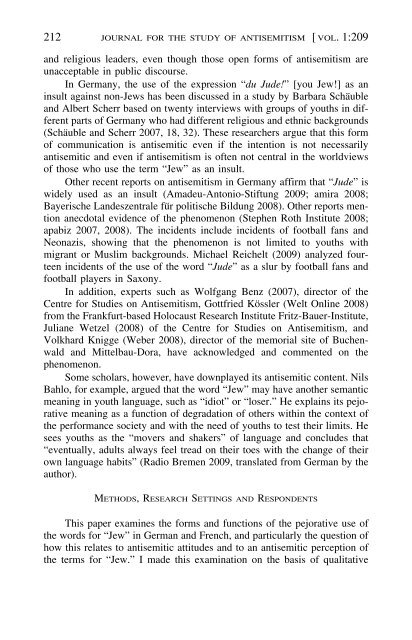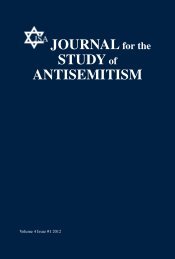Journal for the Study of Antisemitism
Journal for the Study of Antisemitism
Journal for the Study of Antisemitism
Create successful ePaper yourself
Turn your PDF publications into a flip-book with our unique Google optimized e-Paper software.
212 JOURNAL FOR THE STUDY OF ANTISEMITISM [ VOL. 1:209<br />
and religious leaders, even though those open <strong>for</strong>ms <strong>of</strong> antisemitism are<br />
unacceptable in public discourse.<br />
In Germany, <strong>the</strong> use <strong>of</strong> <strong>the</strong> expression “du Jude!” [you Jew!] as an<br />
insult against non-Jews has been discussed in a study by Barbara Schäuble<br />
and Albert Scherr based on twenty interviews with groups <strong>of</strong> youths in different<br />
parts <strong>of</strong> Germany who had different religious and ethnic backgrounds<br />
(Schäuble and Scherr 2007, 18, 32). These researchers argue that this <strong>for</strong>m<br />
<strong>of</strong> communication is antisemitic even if <strong>the</strong> intention is not necessarily<br />
antisemitic and even if antisemitism is <strong>of</strong>ten not central in <strong>the</strong> worldviews<br />
<strong>of</strong> those who use <strong>the</strong> term “Jew” as an insult.<br />
O<strong>the</strong>r recent reports on antisemitism in Germany affirm that “Jude” is<br />
widely used as an insult (Amadeu-Antonio-Stiftung 2009; amira 2008;<br />
Bayerische Landeszentrale für politische Bildung 2008). O<strong>the</strong>r reports mention<br />
anecdotal evidence <strong>of</strong> <strong>the</strong> phenomenon (Stephen Roth Institute 2008;<br />
apabiz 2007, 2008). The incidents include incidents <strong>of</strong> football fans and<br />
Neonazis, showing that <strong>the</strong> phenomenon is not limited to youths with<br />
migrant or Muslim backgrounds. Michael Reichelt (2009) analyzed fourteen<br />
incidents <strong>of</strong> <strong>the</strong> use <strong>of</strong> <strong>the</strong> word “Jude” as a slur by football fans and<br />
football players in Saxony.<br />
In addition, experts such as Wolfgang Benz (2007), director <strong>of</strong> <strong>the</strong><br />
Centre <strong>for</strong> Studies on <strong>Antisemitism</strong>, Gottfried Kössler (Welt Online 2008)<br />
from <strong>the</strong> Frankfurt-based Holocaust Research Institute Fritz-Bauer-Institute,<br />
Juliane Wetzel (2008) <strong>of</strong> <strong>the</strong> Centre <strong>for</strong> Studies on <strong>Antisemitism</strong>, and<br />
Volkhard Knigge (Weber 2008), director <strong>of</strong> <strong>the</strong> memorial site <strong>of</strong> Buchenwald<br />
and Mittelbau-Dora, have acknowledged and commented on <strong>the</strong><br />
phenomenon.<br />
Some scholars, however, have downplayed its antisemitic content. Nils<br />
Bahlo, <strong>for</strong> example, argued that <strong>the</strong> word “Jew” may have ano<strong>the</strong>r semantic<br />
meaning in youth language, such as “idiot” or “loser.” He explains its pejorative<br />
meaning as a function <strong>of</strong> degradation <strong>of</strong> o<strong>the</strong>rs within <strong>the</strong> context <strong>of</strong><br />
<strong>the</strong> per<strong>for</strong>mance society and with <strong>the</strong> need <strong>of</strong> youths to test <strong>the</strong>ir limits. He<br />
sees youths as <strong>the</strong> “movers and shakers” <strong>of</strong> language and concludes that<br />
“eventually, adults always feel tread on <strong>the</strong>ir toes with <strong>the</strong> change <strong>of</strong> <strong>the</strong>ir<br />
own language habits” (Radio Bremen 2009, translated from German by <strong>the</strong><br />
author).<br />
METHODS, RESEARCH SETTINGS AND RESPONDENTS<br />
This paper examines <strong>the</strong> <strong>for</strong>ms and functions <strong>of</strong> <strong>the</strong> pejorative use <strong>of</strong><br />
<strong>the</strong> words <strong>for</strong> “Jew” in German and French, and particularly <strong>the</strong> question <strong>of</strong><br />
how this relates to antisemitic attitudes and to an antisemitic perception <strong>of</strong><br />
<strong>the</strong> terms <strong>for</strong> “Jew.” I made this examination on <strong>the</strong> basis <strong>of</strong> qualitative














